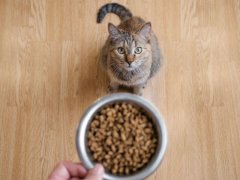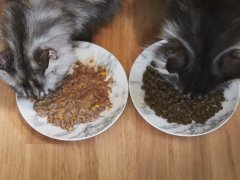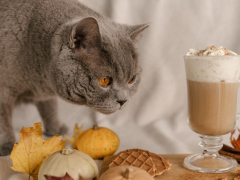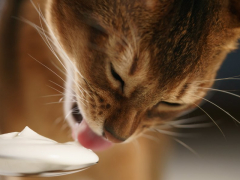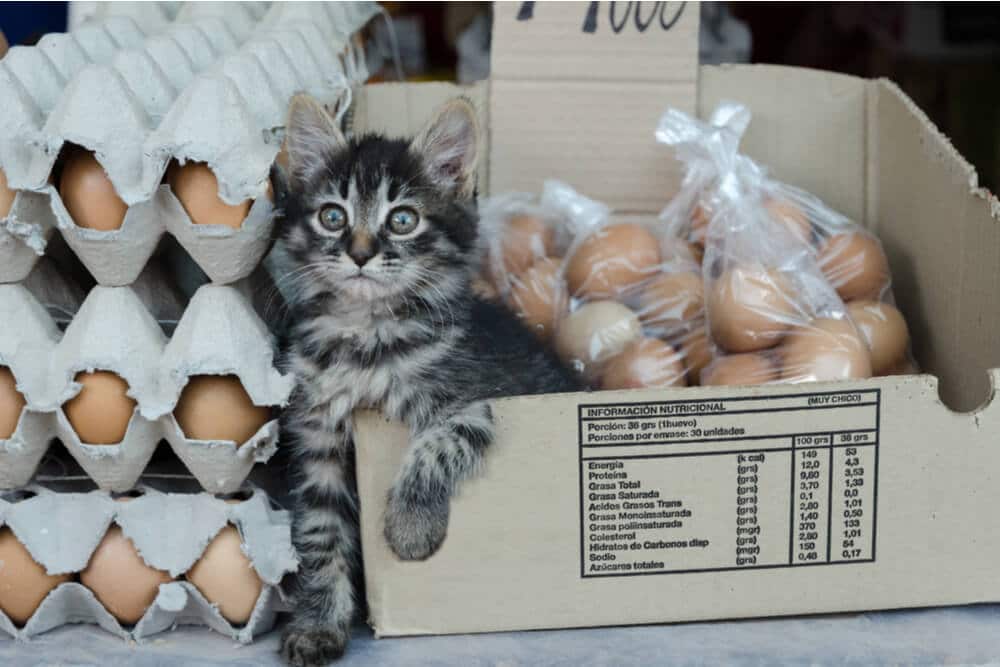
Can cats eat eggs? Cats can safely eat many of the foods we enjoy, but some “people foods” can cause stomach upset in cats or even worse problems. It’s always good to idea to do a little research before giving your cat a new food just to make sure it’s safe to feed to cats.
Are Eggs Good for Cats?
Cooked eggs are in fact safe to feed to cats in moderation, and that’s great news because the nutritional value of eggs is plentiful. Eggs pack a nutritious punch with high-quality protein; amino acids; essential fatty acids; B vitamins, and vitamins A, D, and E.
In addition to high-quality protein, eggs deliver omega-3 fatty acids, which may contribute to a shiny coat. Because cats are obligate carnivores (the majority of their diet should come from meat), cats especially benefit from the protein and amino acids found in eggs.
If your cat needs extra protein in her diet, eggs (especially the whites) can be an excellent source. In fact, some commercial cat foods boast eggs on the ingredients list.
Some people even feed cats ground up eggshells as a supplement when feeding raw diets or homemade cooked diets (the shells contain high amounts of calcium), but if your cat is eating a complete and balanced commercial cat food, this is unnecessary and even potentially harmful. Always talk to your veterinarian before giving your cat any supplements.
Are Eggs Bad for Cats?
Egg whites are high in protein, but egg yolks are high in fat. A little fat in your cat’s diet is a good thing, but too much fat can be harmful. If your cat eats too much of any fatty human food, it can cause stomach upset, including diarrhea and vomiting.
If your cat requires a low-fat diet, either because she is overweight, because she suffers from kidney disease or because she is prone to pancreatitis (potentially life-threatening inflammation of the pancreas), skip the eggs altogether, or feed only cooked egg whites and avoid feeding the yolk.
How to Safely Feed Your Cat Eggs?
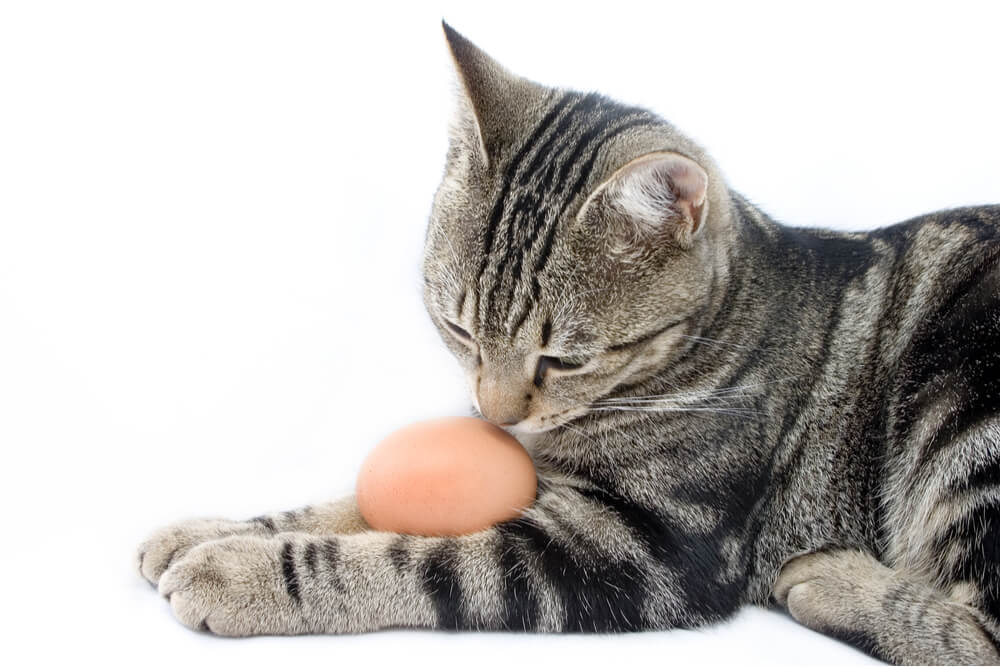
You can safely give your cat unseasoned cooked eggs as a treat. Scrambled, hard-boiled, or poached eggs can all make a healthy snack or nutritious meal-topper.
Feed your cat small pieces of scrambled or hard boiled eggs on their own as a treat, or use eggs as a nutritious meal-topper for your cat’s food. Always feed eggs well cooked. Like raw meat, raw eggs carry the risk of Salmonella infection, known as Salmonellosis.
In cats, Salmonella infection can cause diarrhea, vomiting, fever, decreased appetite and lethargy.
Even if your cat doesn’t become ill, it’s possible for cats to shed Salmonella bacteria in their stool for several weeks after recovering from a Salmonella infection, potentially passing the bacteria along to humans in the house. Cooked eggs are the safest for your cat.
As when introducing any new food, start off slowly.
Try about 1 teaspoon of egg at first, watching your cat for any sign the egg doesn’t agree with her digestive system. If you notice any diarrhea, vomiting, or any other sign that your cat is not tolerating the egg, discontinue feeding it and contact your veterinarian.
If your cat does well with 1 teaspoon of egg, you can feed as much as about 1 tablespoon of cooked egg (well scrambled or hard-boiled) once a day.
One tablespoon might not sound like much, but when you consider a cat’s stomach is about the size of a ping pong ball, 1 tablespoon is a lot! Too much egg could potentially cause stomach upset. Also, even though eggs are healthy, a high-quality nutritionally complete and balanced diet should account for the majority of your cat’s calorie intake for the day.
If your cat eats too much of any other food, whether it’s egg or commercial cat treats, she risks upsetting the balance of her overall diet.
Also, too many extra calories can contribute to obesity. When feeding extras like eggs, make sure the additional food is no more than 10% of your cat’s total daily calorie intact, which the remaining 90% coming from a completed and balanced food.
Also Read: 6 Delicious Homemade Cat Food Recipes
Eggs for Cats: A Safe and Healthy Treat
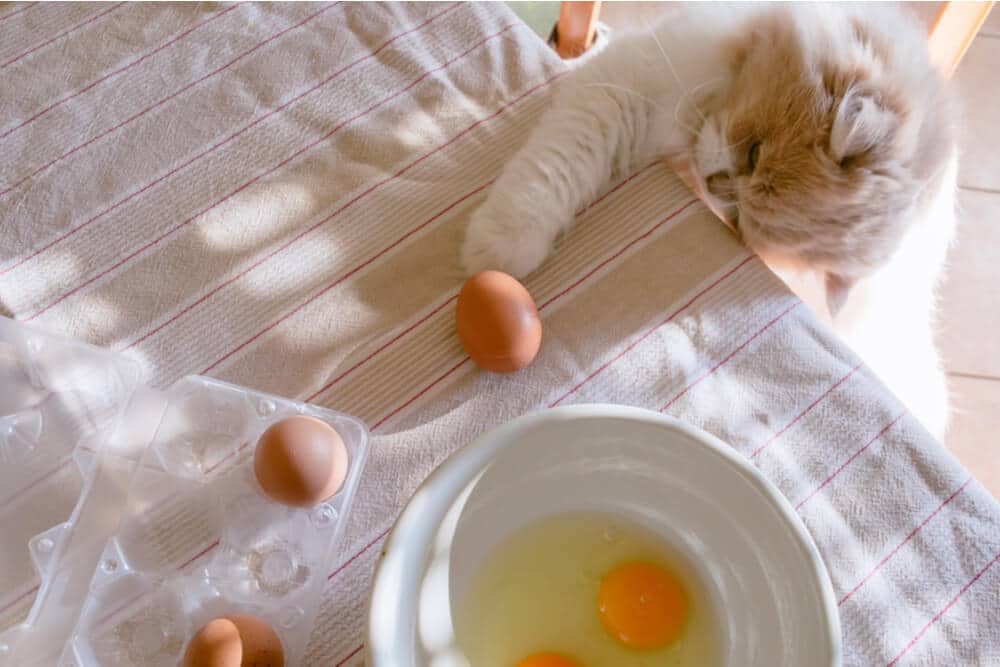
Egg yolks and whites have different nutritional qualities. Whites are rich in protein, while egg yolks are fatty. For this reason, cats on a low-fat diet may want to avoid egg yolks and whole eggs.
Although cats are known to be finicky eaters, most cats enjoy eating eggs. Small amounts of egg can be a great treat. It’s always best to check with your veterinarian first before adding any new foods like eggs to your cat’s diet. If your veterinarian says your cat can safely eat eggs, give it a try. Just make sure not to overdo it.
